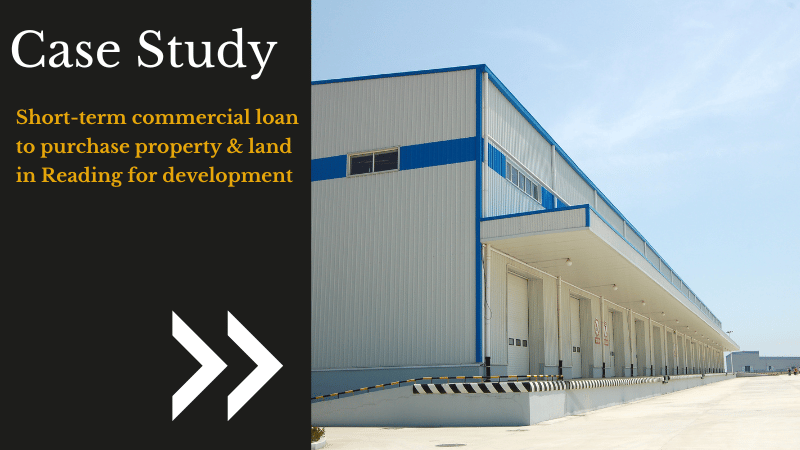
We arrange commercial bridging loans on a daily basis - and we've won awards for doing so.
Commercial Bridging Loans
- Market-leading commercial bridging loans from £50,000 to £25m
- Rates from 0.55% pm
- Lower rates for £1 million+ commercial bridging loans
- Finance within 7 working days depending on your circumstances
- Terms from 3 months to 3 years
- LTVs up to 80% (can be greater if other assets are in the background)
- Interest roll up options
- Buy to let, HMO, investment and commercial properties
- Light refurbishment finance (currently uninhabitable, under permitted development rules, require internal refurbishment)
- Heavy refurbishment finance (extensions, basement digs, loft conversions, commercial to residential, barn conversions)
- Bridging finance for business purposes (purchasing land or new premises, deposit for new purchase, business growth)
- Alternative assets considered for security e.g. pension, investment porfolios, fine art, classic cars
- Automated valuation option for properties under £1m
- We provide a friendly, professional service to help you get the money you need at the best available rates
Latest Commercial Bridging Loan Rates
Rates from: Downsizing/Upsizing Releasing Funds From Your Home Short-Term Lease Finance Auction Purchase As at 17th January 2025 Rates from: Light & Heavy Refurb Finance For Unmortgageable Properties Land Purchase with planning As at 17th January 2025 Rates from: Up to 80% LTV Minimum Loan £500k Minimum net income £100k As at 17th January 2025 Thank You for your interest - please complete the form below and a member of our team will be in contact.Residential
Buying Before Selling?
0.55% pm
Development & Refurb
Fast Finance
0.55% pm
Residential
Large Bridging Loans
0.55% pm
Contact Us
Our strength as a specialist finance broker is our ability to arrange the most suitable financial solution to meet your requirements. We utilise our strong relationships with private banks, specialist lenders and wealth managers to access the best available rates on the market.
Call us on 0117 959 5094 to discuss your requirements.
Written by: Sam O'Neill & Sam Hodgson
Last Updated: 03/10/2023
What is a commercial bridging loan?
A commercial bridging loan is a short-term property finance loan used for buying commercial property.
They typically come as bespoke products depending on the borrowers’ needs.
However, they are commonly used with the intent to “bridge a gap”.
They are designed to secure a property for commercial use, or investment properties that will become a commercial use property – some examples could be:
- Warehouses, industrial or farming premises
- Office spaces
- Retail establishments
- Eateries or pubs and restaurants etc.
- Mixed-use property
- Large HMOs (House in multiple occupancy)
This, while not an exhaustive list, gives you a good idea as to the versatility of a commercial bridging loan – and how it may be suited to your own circumstances if you are looking to get a loan for a property to be used commercially, or as premises to be used in your own business.
Read our latest commercial bridging loan case study, in which we helped our clients secure property and land in Reading for development.
Bridging loan calculator
See what a bridging loan could cost you with our bridging loan calculator.
What are the advantages of a commercial bridge loan?
The main draw for investors, and property developers, is the speed at which a commercial bridge loan can be secured, and the flexibility in which it can be applied to different scenarios.
Fast funding – Typically, commercial bridging loans can be processed and approved within 5 to 7 working days, depending on complexity, which is beneficial for borrowers who need to close on a property transaction as soon as possible.
Flexible repayment terms – For borrowers, especially those in property development, flexibility in repayment is a great benefit when taking into account possible delays and unforeseen costs. Additionally, there are no early repayment plans with commercial bridging loans, and you often have to option to “roll up” interest to be paid at the end of the term.
Competitive interest rates – Commercial bridging loans come with higher interest rates than traditional loans, yet they still offer a competitive rate compared to other short-term financing options. Additionally, interest rates can vary depending on the lender, so it is important to shop around to find the best rate.
Investment opportunities – Bridging loans for commercial property provide borrowers with the opportunity to invest, when they may not have otherwise been able to raise capital for a specific venture. With a bridging loan, investors can access a temporary source of finance to be used for their purposes – whether that’s a land purchase, property development on a larger scale, or buying up multiple properties.
What are commercial bridging loans commonly used for?
The uses of commercial bridging loans are varied and flexible enough to suit the needs of any business or investor, but it is important to keep in mind the potential risks associated with it.
Lenders will need to be assured of a solid exit plan – a repayment plan, typically tied to your collateral, which is often the property the commercial bridging loan is secured against.
That being said, here is a quick rundown on what a commercial bridging loan can be used for:
- Buy-to-let (BTL) properties
- HMO (a house in multiple occupation) property investing
- Additionally, a lender will consider any commercial property
- Light or heavy refurbishment of a property - (from simple renovations to transforming a property from an unliveable state, or financing extensions or conversions)
- Business purposes – (this could include; land purchasing, deposits for commercial property, or growth of the business, and resolving cash-flow issues.)
In addition, a commercial bridging loan (they may be referred to as a business loan in this case) can be used to fund business expansion, or the purchasing of necessary equipment – you can find out more details here on our business loans service.
Commercial Bridging Loan Case Studies
More case studies:
How much can you borrow with a commercial bridging loan?
Depending on additional security in the background, you can borrow up to 100% LTV (Loan-to-Value). However, typically the maximum LTV is 75%, and from commercial finance lenders, you can secure £250,000 to £25m. There are no fixed upper limits, however, so we can facilitate any loan amount for you if required.
There are also a number of additional costs associated with bridging loans, such as survey costs and set-up fees, so it is important to factor in this information when it comes to overall costs.
You can also our bridging loan calculator to get an indication of costs and figures - this works for commercial bridging finance too.
What is the Application Process?
When considering a commercial bridging loan application, you'll find a streamlined and efficient process tailored for speed and flexibility:
- An initial consultation where you discuss your specific loan requirements and objectives.
- Following this, you'll need to provide the essential documentation (bank statements, business finances, tax returns, insurance information of the property etc.)
- Once your application is submitted, the lender will review it, which may also involve a property valuation if deemed necessary.
- If your application gets the green light, you'll be presented with a comprehensive loan offer, detailing terms and interest rates.
- The next step is the disbursement of funds, which typically occurs within 5-7 working days after accepting the offer
Remember, it’s essential to have a solid exit strategy, typically tied to the collateral property securing the loan. This strategy ensures a smooth transition and repayment plan.
Eligibility for Commercial Bridging Loans
Commercial bridging loans are accessible to a wide range of borrowers:
- Individuals
- Partnerships
- Limited companies
- Offshore limited companies
- Trusts
- Pension funds
- UK residents
- Expats
- Foreign nationals
Importantly, having adverse credit is typically not a barrier to obtaining these loans.
Although, depending on the lender, this may harm your chances for better rates.
Before applying for a commercial bridging loan, it's crucial to gather and provide comprehensive details to streamline the application process:
Personal Details:
- Nationality and residency status (UK resident, expat, foreign national).
- Employment or business ownership details, including income sources.
- Credit history and financial background.
Property Details:
- Property type (commercial property, land, etc.).
- Property address and legal description.
- Current property value and its condition.
- Any existing mortgages or loans on the property.
- Valuation reports, surveys, and property appraisal, if available.
- Lease details if the property is leased, including lease term and conditions.
Viable Exit Strategy:
A well-defined exit strategy is essential for repayment assurance. Common strategies include:
- Sale of the property.
- Remortgage.
- Income from property rental.
- Proceeds from another investment or financial source.
Financial Documentation:
- Bank statements showcasing financial stability.
- Tax returns and income proof.
- Business financial statements (if applicable).
- Details of any additional collateral or assets offered as security.
- Summary of the purpose of the loan (e.g., property purchase, refurbishment, business expansion).
Legal and Property Documentation:
- Copies of property deeds and titles.
- Insurance information for the property.
- Building permits and planning permissions (if applicable).
- Any legal contracts related to the property.
These loans offer flexible solutions for various borrowers, and the application process is designed to accommodate diverse needs.
However, this can be subject to a lender’s criteria and you may find you’ll have to produce additional documents or details depending on your own circumstance, and the nature of the loan and its purposes.
Is All Commercial Bridging Non-Regulated?
Commercial Bridging Loans for Commercial Properties (Non-Regulated) - these loans, used for purely commercial properties like offices or retail spaces, are typically not regulated. That means they aren't closely monitored, or regulated at all, by the FCA. They're often used for short-term business needs, like buying or renovating commercial real estate.
Semi-Commercial Properties and Regulation (Depends on Occupancy) - Semi-commercial properties have both residential and commercial use. Whether a loan for such a property is regulated depends on how much of it is used as a residence:
- Non-Regulated: If it's mainly for commercial use with little residential space (e.g., a shop with a small flat above), the loan is usually non-regulated.
- Regulated: If a significant part is your home or if the loan is primarily for a residence with a small business, it might be regulated.
Importantly, non-regulated isn’t a bad thing or unsafe. It just means there are fewer rules and protections in place. Regulated loans offer more consumer protection, mainly for home-related loans.
So, it's crucial to know your loan type for the right legal and financial safeguards. Consulting with one of our experts can help you understand this better.
Choosing the Right Lender for Your Commercial Bridging Loan
When looking for a commercial bridging loan, selecting the right lender is important. Here's a couple of things to bear in mind:
- Specialised Lenders - Commercial bridging loans are typically offered by lenders who specialise in short-term property finance. They understand the unique aspects of commercial properties.
- Lending Criteria - Lenders have different criteria and risk preferences. Some may prefer certain property types or business purposes.
- Broker Assistance - If you're new to this, or even if you aren’t – it’s always best to consult expert brokers to aid you - like us, at Clifton Private Finance. We have industry knowledge and can match you the best, most suited, lender for you.
- Negotiation – A broker can also negotiate favourable terms, like interest rates and repayment flexibility, on your behalf. This can save you time and money – especially when it concerns a complex or large commercial bridging loan. Additionally, we can streamline your application, gather documents, and submit them to the right lenders, expediting approval and funding.
- Access to Niche Lenders - For a commercial bridging loan you’ll want to connect to the right lenders. Some of these lenders may not deal directly with individuals – in fact, most don’t. Working with us allows access to niche, specialist and/or private lenders not found through traditional channels. These lenders can offer tailored solutions for a commercial venture.
Finding the right lender for a commercial bridging loan can be complex due to varying criteria. Thankfully, brokers can simplify the process, and improve your chances of securing the right loan for your commercial property.
Are there any Alternatives to Commercial Bridging Loans?
When seeking alternatives to commercial bridging loans, one viable option to consider is commercial mortgages.
These mortgages offer a lower-cost alternative for longer-term borrowing needs. Unlike bridging loans, commercial mortgages typically extend for up to 25 years and often come with lower interest rates.
Here are a few other alternatives (similar types of property finance):
- Secured loans
- Development finance
- Business bridging loans designed for business expansion or equipment purchases
- Asset-backed loans that enable you to use valuable assets like art or investments as collateral.
There are alternatives out there, but ultimately, it will depend on your specific scenario and requirements.
Need a bridge loan for commercial property?
At Clifton Private Finance, we can facilitate your commercial bridging loan through a number of specialist lenders across the entire short-term market; lenders who are not typically available through the retail market.
Whether you are a property developer, investor, or a novice – we can get you a decision in principle quickly, for whatever your purposes are for a commercial bridging loan. With our expertise and depth of knowledge, we can find you an appropriate lender with favourable rates.





